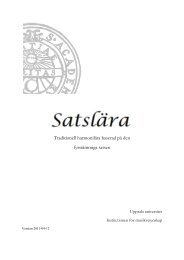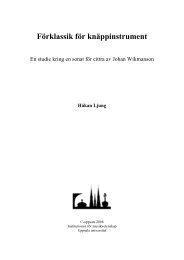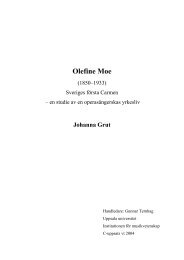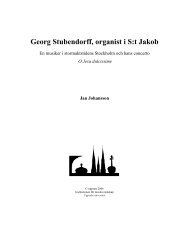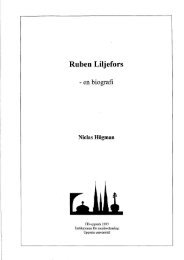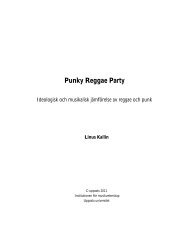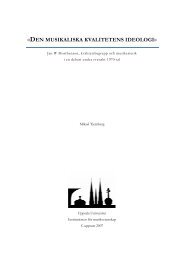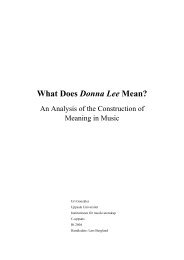Music for the Mad - Institutionen för musikvetenskap - Uppsala ...
Music for the Mad - Institutionen för musikvetenskap - Uppsala ...
Music for the Mad - Institutionen för musikvetenskap - Uppsala ...
You also want an ePaper? Increase the reach of your titles
YUMPU automatically turns print PDFs into web optimized ePapers that Google loves.
eason. In <strong>the</strong> preface <strong>for</strong> his opera Albion and Albanius (1685) Dryden explains his choice of<br />
protagonist, plot and <strong>for</strong>m (i.e. all-sung opera):<br />
24<br />
The suppos’d persons of this musical drama, are generally supernatural, as<br />
god and goddesses, and heroes, which are at least descended from <strong>the</strong>m, and<br />
are in due time, to be accepted into <strong>the</strong>ir number. The subject <strong>the</strong>re<strong>for</strong>e being<br />
extended beyond <strong>the</strong> limits of human nature, admits of that sort of marvellous<br />
and surprizing conduct, which is rejected in o<strong>the</strong>r plays. 61<br />
Singing is to be understood as part of <strong>the</strong> “marvelous and surprizing conduct described,” and<br />
is motivated by <strong>the</strong> supernaturalism of <strong>the</strong> plot and its characters. A different credibility pre-<br />
vailed <strong>for</strong> gods and goddesses, who were literary not normal people and could so be allowed<br />
to sing when earthly characters could not. There was, as we shall see, ano<strong>the</strong>r category of cha-<br />
racters that were as little expected to act normally as supernatural characters, and who could<br />
<strong>the</strong>re<strong>for</strong>e be given songs at unexpected times, i.e. on occasions at which singing would be not<br />
motivated by <strong>the</strong> plot, not even as entertainments framed in by loosely connected dialogue.<br />
There were mad people. Purcell’s mad songs <strong>for</strong> Durfey’s comedies occur almost exclusively<br />
at such unexpected places, and without dialogue to frame <strong>the</strong>m in. In <strong>the</strong> case where it does<br />
occur framed in and motivated by dialogue, notably “From rosy bowers” in part III of Don<br />
Quixote, it is a clear indication of <strong>the</strong> inau<strong>the</strong>nticity of <strong>the</strong> madness, as will be discussed be-<br />
low.<br />
Thomas Durfey, who was deeply interested in musical drama and would in <strong>the</strong> early<br />
eighteenth century unsuccessfully venture into opera, gave music a significant place in his<br />
comedies. As John McVeagh stated, music was important <strong>for</strong> Durfey, though he was not yet<br />
in <strong>the</strong> late seventeenth century willing to let it take over from literature. 62 Songs in general in<br />
Durfey’s comedies serve <strong>the</strong> same amusing and extra-dramatic characterization as Price de-<br />
scribed. One such example is Berenice’s “How vile are <strong>the</strong> sordid intrigues” from <strong>the</strong> second<br />
act of The Marriage-Hater Match’d (1692). Appearing as a sudden whim, like so many o<strong>the</strong>rs<br />
of Berenice’s actions, in a scene where Lord Brainless’ attempt to treat one of <strong>the</strong> ladies with<br />
an Italian song has been interrupted by her howling lapdog, it gives some additional under-<br />
standing of <strong>the</strong> “freakish” (i.e. in <strong>the</strong> words of Curtis Price “devilish and light hearted to <strong>the</strong><br />
point of madness”) nature of Berenice:<br />
Darewell: […] shall I beg a word or to, <strong>Mad</strong>am.<br />
61 John Dryden preface to Albion and Albanius (London 1685) p. 1.<br />
62 McVeagh, Durfey, p. 113.



